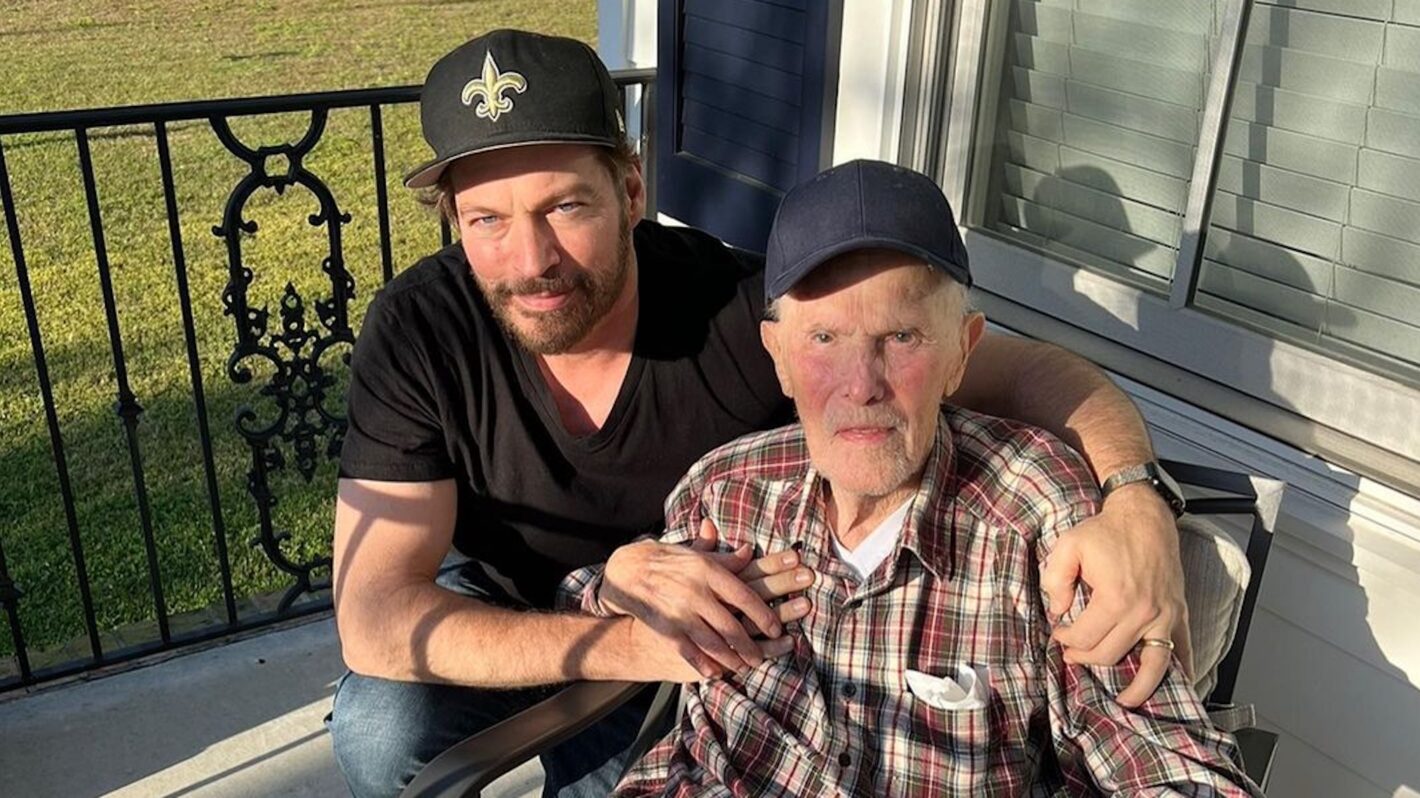Addressing The Buzz: Did Harry Connick Jr. Really Have A Stroke?
It's almost like a whisper that moves through online spaces, that sort of question about a beloved public figure's well-being. People, you know, really care about their favorite stars, and when a rumor starts, a lot of folks naturally want to find out what's true. So, there's been some talk, a fair bit of chatter, wondering if the incredibly talented Harry Connick Jr. might have experienced a stroke. This kind of inquiry, quite frankly, shows how much we connect with artists who bring joy to our lives, and it also highlights how quickly information, or sometimes misinformation, can spread.
We see it happen a lot, actually. A search pops up, maybe on a social media feed, or someone mentions something they heard, and before you know it, a lot of people are looking for answers. When it comes to someone like Harry Connick Jr., whose career spans music, acting, and even television hosting, people are certainly invested. They want to know if he's alright, if he's healthy, and what might be going on behind the scenes.
This article aims to get to the bottom of that specific question about Harry Connick Jr.'s health. We'll look at what we know, what the public record shows, and why these kinds of questions often come up. It's also a good chance to talk a little about general health awareness, especially regarding serious conditions like a stroke, which is a really important topic for everyone to understand. So, let's explore this together.
- Statewins
- Camilla Araujo Leaked Only Fans
- Porno T%C3%BCrk Sotwe
- Telegram Qarxis Video
- Shane Dawson Cat Incident
Table of Contents
- Harry Connick Jr.: A Brief Look
- The Truth About Harry Connick Jr. and Stroke Rumors
- Why Do Health Rumors About Celebrities Spread?
- Understanding Stroke: Vital Information for Everyone
- How to Check Health Information Online
- Frequently Asked Questions
- Staying Informed and Caring for Your Health
Harry Connick Jr.: A Brief Look
Harry Connick Jr. is, by all accounts, a person with many talents. He's a singer with a smooth voice, a skilled pianist, an actor who has appeared in quite a few films and TV shows, and even a host for daytime television. Born in New Orleans, Louisiana, he grew up surrounded by music, and that, you know, really shaped his path. He started playing piano at a very young age and quickly became known for his jazz style, often bringing a classic, big-band sound to a wider audience.
His career took off in the late 1980s, and he has since released numerous albums, won multiple Grammy Awards, and sold millions of records worldwide. Beyond music, he's shown his acting chops in movies like "Independence Day" and "Dolphin Tale," and on television, he was a judge on "American Idol" for a while, too. He's a person who, frankly, seems to be always working on something new and interesting.
Personal Details and Bio Data
| Full Name | Harry Connick Jr. |
| Born | September 11, 1967 |
| Birthplace | New Orleans, Louisiana, U.S. |
| Occupation | Singer, Pianist, Actor, Television Host |
| Spouse | Jill Goodacre (m. 1992) |
| Children | 3 Daughters |
| Notable Awards | Grammy Awards, Emmy Awards |
The Truth About Harry Connick Jr. and Stroke Rumors
So, let's get right to the point about the question of Harry Connick Jr. having a stroke. As of today, and after looking at all available public information, there is simply no credible report, statement, or news from Harry Connick Jr. himself, his representatives, or any major, trustworthy news source that indicates he has suffered a stroke. It's pretty clear, actually, that this particular piece of information seems to be a rumor, a bit of speculation that has unfortunately made its way around.
- Xnxx Actress Name List With Photo
- Wwwdownloadhubwatch
- Caitlin Clark Leaks
- What Bit Brodie Moss
- Play Condo Games
Public figures, you see, often face a lot of scrutiny and, at times, false stories about their personal lives and health. It's a challenging part of being in the public eye. When a person is as well-known and active as Harry Connick Jr., any slight change in appearance or a moment of quiet can sometimes be misinterpreted, or, you know, just lead to people wondering things. It's very important to rely on official statements or reports from well-established media outlets when trying to figure out what's true about someone's health.
He has, in fact, continued to perform, record music, and appear publicly, showing no signs that would suggest such a serious health event. This ongoing activity, in a way, serves as a strong indicator that the rumors about him having a stroke are not based in reality. We should always try to get our facts from reliable places, especially when it comes to someone's personal health.
Why Do Health Rumors About Celebrities Spread?
It's a curious thing, how quickly rumors about public figures, especially about their health, can spread. There are a few reasons why this happens, and it's something we see time and again. For one, people feel a connection to celebrities; they admire their work and, you know, feel like they know them. This personal feeling can make them more eager to hear about their lives, even if the information isn't always accurate.
Another reason is the speed of information sharing today. With social media and countless websites, a piece of news, whether true or not, can travel around the world in moments. Someone might post a question, or a blog might make a speculative claim, and that, you know, can quickly be picked up and shared by many others. There isn't always a filter for accuracy built into these fast-moving channels.
Sometimes, too, people might misunderstand something they see or hear. A celebrity might look tired, or cancel an event for a private reason, and that can lead to all sorts of guesses about their health. These guesses, in some respects, can then turn into "facts" as they get repeated. It's a good reminder that just because something is widely discussed doesn't mean it's actually true.
Understanding Stroke: Vital Information for Everyone
While the rumors about Harry Connick Jr. having a stroke appear to be untrue, the conversation itself gives us a chance to talk about strokes. A stroke is a very serious medical emergency that happens when the blood supply to part of your brain is interrupted or reduced. This prevents brain tissue from getting oxygen and nutrients, and brain cells can start to die within minutes. Knowing about strokes, really, can make a big difference for anyone.
There are two main kinds of stroke. An ischemic stroke is the most common kind, and it happens when a blood vessel that feeds the brain gets blocked, often by a blood clot. A hemorrhagic stroke happens when a blood vessel in the brain breaks or leaks. Both types, however, need immediate medical attention. The effects of a stroke can be lasting, affecting movement, speech, and even memory, depending on which part of the brain is affected. So, it's pretty important to know what to look for.
Recognizing the Signs of Stroke
Recognizing the signs of a stroke quickly is absolutely vital. The faster someone gets help, the better their chances are for recovery and reducing long-term damage. A very easy way to remember the main signs is to think of the acronym F.A.S.T., which is a great tool for anyone, you know, to have in their mind.
- Face drooping: Does one side of the person's face droop or feel numb? Ask them to smile. Is the smile uneven?
- Arm weakness: Is one arm weak or numb? Ask the person to raise both arms. Does one arm drift downward?
- Speech difficulty: Is their speech slurred? Are they having trouble speaking or understanding what you're saying? Ask them to repeat a simple sentence.
- Time to call 911: If someone shows any of these signs, even if they go away, call emergency services right away. Every minute counts.
Other signs can include sudden confusion, trouble seeing in one or both eyes, sudden trouble walking, dizziness, loss of balance, or a sudden, very bad headache with no known cause. Any of these symptoms, really, should be taken seriously and looked at by a doctor immediately.
Common Risk Factors
While a stroke can happen to anyone, some things can increase a person's chances of having one. Knowing these risk factors, you know, can help people make choices that might lower their risk. Some of the common ones include:
- High blood pressure: This is a very big risk factor. Managing blood pressure with diet, exercise, and sometimes medicine is really important.
- High cholesterol: Too much cholesterol can build up in arteries, making them narrower.
- Diabetes: This condition can damage blood vessels over time.
- Heart disease: Conditions like atrial fibrillation (an irregular heartbeat) can lead to blood clots that travel to the brain.
- Smoking: Smoking damages blood vessels and thickens blood.
- Obesity: Being overweight can contribute to high blood pressure, diabetes, and heart disease.
- Lack of physical activity: A sedentary lifestyle can increase many risk factors.
- Unhealthy diet: Eating too much saturated fat, trans fat, cholesterol, and sodium can raise your risk.
- Age: The risk of stroke increases with age.
- Family history: If family members have had strokes, your risk might be higher.
Many of these factors, you know, can be managed with lifestyle changes or medical treatment. It's about taking charge of your health where you can.
Steps for Prevention
The good news is that many strokes can be prevented by making healthy choices. Taking proactive steps, really, is a powerful way to protect your brain and your overall health. Here are some key things you can do:
- Manage blood pressure: Regular checks and working with a doctor to keep it at a healthy level are essential.
- Eat a balanced diet: Focus on fruits, vegetables, whole grains, lean proteins, and healthy fats. Limit processed foods, sugary drinks, and unhealthy fats.
- Stay active: Aim for at least 150 minutes of moderate-intensity exercise each week. This could be brisk walking, swimming, or cycling.
- Maintain a healthy weight: Losing even a little weight if you're overweight can make a big difference.
- Quit smoking: This is one of the most important things you can do to lower your stroke risk.
- Limit alcohol: If you drink, do so in moderation.
- Manage diabetes: Keep blood sugar levels in check with diet, exercise, and medication as prescribed.
- Treat heart conditions: If you have heart issues like atrial fibrillation, follow your doctor's advice for treatment.
- Regular check-ups: See your doctor for regular screenings and to discuss any concerns you have about your health.
These steps, in a way, build a strong foundation for a healthier life, reducing the likelihood of a stroke and many other health problems. It's about being kind to your body.
Life After Stroke: Recovery and Support
For those who do experience a stroke, the journey of recovery can be a long one, but it's often filled with hope and progress. Recovery looks different for everyone, depending on the stroke's severity and the part of the brain affected. Rehabilitation, you know, plays a very big role. This might include physical therapy to regain movement, occupational therapy to help with daily tasks, and speech therapy to improve communication. Support groups and family involvement are also quite important.
Many people, with dedicated effort and good support, can regain a lot of their abilities and live fulfilling lives after a stroke. It's a testament to the brain's ability to adapt and heal, and to the power of human resilience. The key is to start rehabilitation as soon as possible and to stick with it. There are many resources available for survivors and their families, offering guidance and encouragement through what can be a challenging time. For more information, you can learn more about stroke recovery on our site.
How to Check Health Information Online
In this age of instant information, it's more important than ever to be smart about what you read online, especially when it comes to health. When you see a claim about someone's health, or any health information really, take a moment to pause. Don't just accept it at face value. A good habit, you know, is to always consider the source.
- Look for reputable sources: Stick to established news organizations, medical institutions, government health websites, or well-known health organizations. These places generally have editorial processes and medical professionals checking their facts.
- Check for multiple sources: If only one obscure website is reporting something, and no major news outlets are, that's a red flag. True, important news usually gets reported widely.
- Consider the date: Is the information current? Health recommendations and news can change over time.
- Look for expert backing: Does the article quote doctors, researchers, or other health professionals? Are there links to scientific studies?
- Be wary of sensational headlines: If a headline sounds too shocking or too good to be true, it probably is.
Being a thoughtful reader, you know, helps protect you from misinformation and ensures you're getting accurate health details. It's a simple step that can make a very big difference.
Frequently Asked Questions
People often have questions when they hear news or rumors about public figures. Here are some common inquiries related to the topic of Harry Connick Jr.'s health and strokes in general:
Has Harry Connick Jr. ever had a serious health scare?
Based on public records and statements, there have been no widely reported serious health scares for Harry Connick Jr., including a stroke. He has maintained a busy career schedule, which, you know, suggests good health. If there were a significant health event, it would almost certainly be communicated by him or his team.
What are the most common causes of stroke?
The most common causes of stroke typically involve conditions that affect blood flow to the brain. These include high blood pressure, high cholesterol, diabetes, and heart conditions like atrial fibrillation. Lifestyle choices such as smoking, a poor diet, and not enough physical activity also, you know, contribute significantly to the risk. Understanding these causes helps in prevention.
How can I reduce my risk of having a stroke?
You can greatly reduce your stroke risk by adopting healthy habits. This means eating a balanced diet rich in fruits and vegetables, getting regular exercise, maintaining a healthy weight, and not smoking. It's also very important to manage any existing health conditions like high blood pressure or diabetes with your doctor's help. You can learn more about stroke prevention on our site, which is a good resource.
Staying Informed and Caring for Your Health
The interest in Harry Connick Jr.'s health, while based on an apparent misunderstanding, serves as a really good reminder. It shows how much we value the well-being of people we admire, and it also highlights the importance of getting accurate information. We've seen that, you know, there's no public evidence that Harry Connick Jr. has had a stroke, and it's always best to rely on verified sources for such personal news.
More broadly, this discussion has given us a chance to talk about strokes themselves. Knowing the signs of a stroke, understanding the risk factors, and taking steps for prevention are truly valuable pieces of information for everyone. Your health is, you know, one of your most precious assets. So, take good care of yourself, and if you ever have concerns about your health or someone else's, please talk to a medical professional. They are the best people to give you accurate advice and care.

Harry Connick Jr. Recovers After Mild Stroke

Harry Connick Jr. Recovers After Mild Stroke

Harry Connick Jr. Shares Sad News That His Father Harry Connick Sr. Has